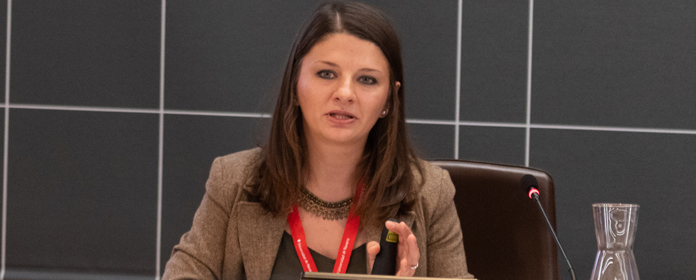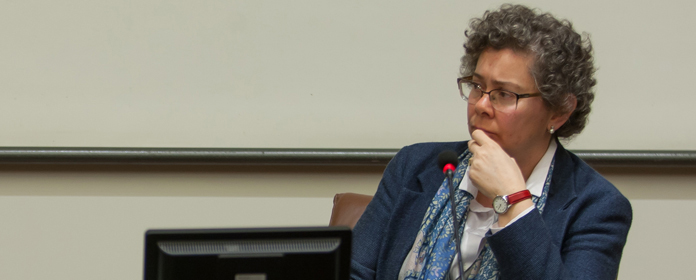"The coronavirus crisis has exposed the weaknesses of the European Union as a common project ".
On Europe Day, Institute for Culture and Society researcher Anna Dulska analyzes the European strategy in the face of the coronavirus pandemic.

PHOTO: Manuel Castells
Anna Dulska holds a Ph.D. in History, Master's Degree in Dynamics of Change in Advanced Modern Societies and a B.A. in Business Administration. She is currently a researcher at project 'Creativity and Cultural Heritage' of the Institute for Culture and Society (ICS) of the University of Navarra.
On Europe Day, which commemorates the speech of Robert Schuman, French Foreign Minister, in 1950, considered the germ of the European Union (EU), the expert analyzes the European strategy in the face of the current COVID-19 crisis. According to Dulska, this crisis has meant a two-part examination of a previously divided EU. First, it has had to manage an unprecedented status with great human losses, and then it will have to face an economic crisis by demonstrating what it has learned after the 2008 crisis.
How is the COVID-19 crisis affecting Europe?
The coronavirus pandemic that is affecting our world has been a double crisis. On the one hand, the properties and transmission of the virus that do not understand geopolitics or borders. Until a vaccine or treatment is found, these factors are beyond our control. On the other hand, there is what does depend on humans: the management of this contingency at all levels of political or economic organization, from international organizations, such as the World Health Organization, to the smallest territorial units. From multinationals to neighborhood stores, on final, from the global to the local. Thus, the incidence of the pandemic in societies is the net force between the epidemiological characteristics of the virus and the diligence (the when), the effectiveness (the how) and the efficiency (the by how much) of the management being carried out by the leaders.
In this sense, the current crisis is a test for everyone: organizations, states and individuals. A very difficult test because human lives are at stake. Moreover, it is an unprecedented status in the contemporary world, so no one comes with a specific preparation and their performance depends on the qualities and competencies they have developed so far.
What about the European Union as an organization?
It has affected the European Union in two ways: as an international organization and as the sum of its member states. As an organization, the crisis has coincided with a very inopportune moment, at plenary session of the Executive Council discussion on its future and enormous tension between member states, whose visions of a united Europe diverge substantially. To such an extent that, instead of seeking a compromise, tensions and fractures that are difficult or impossible to repair began to emerge.
At the crossroads at which the EU found itself in January, two paths presented themselves. One towards further integration or quasi-federalization, which would entail ceding a considerable portion of national sovereignty and transferring greater competences to the Union. The other was to reinforce the original idea of the European Communities, that of a community of nations in search of cooperation, growth and benefits for all, but without prejudice to their independence.
What tensions are now emerging with the pandemic; have new ones arisen or have existing ones been reinforced?
Throughout history, a common external enemy either helped forge alliances and/or consolidate shared projects or, on the contrary, exposed their weaknesses or unfeasibility. This time was no different. Faced with what was happening in Italy, the Member States reacted very unevenly. Some took precautions early on, putting public health issues first, while others were characterized by procrastination and took their time in taking decisions, claiming that they were complying with the recommendations coming from upstream, especially from the WHO.
The consequences are reflected in the contagion curves. It was not until the measures being taken began to affect the pillars of the EU - the free flow of people and goods - that the Community's absence from the management crisis became apparent. The first countries to close their borders were severely criticized for violating European freedoms but, shortly afterwards, the most critical countries did the same and also banned the export of medical and sanitary equipment. The case of a shipment of almost one million masks that an Italian business bought in China through a German distributor was very striking, but since it was considered a German import, it never arrived at its destination. The withdrawal suffered by Italy was such that the President of the European Commission, Ursula von der Leyen, was forced to apologize to the Italians.
So how could this crisis have been managed if there were no differences between countries?
The coronavirus crisis has exposed the weaknesses of the European Union as a common project . It is true that the EU is a hybrid organization with no equivalent in the whole world, neither an international economic cooperation agreement (like ASEAN), nor a federation (like the United States of America). According to the form given to it by the Lisbon Treaty, the European Union has three types of competences: exclusive, shared and supporting. Among the shared ones is that of supporting public health in Europe. The EU is empowered by the treaty to complement national health policies, supporting governments in achieving common objectives, sharing resources and overcoming common challenges.
In addition, the principles laid down in the Maastricht Treaty governing EU action must be borne in mind: proportionality and subsidiarity. The former states that the scope of EU action must not exceed what is necessary to achieve its objectives. The second, that the EU must act when it is not possible to fulfill the goal sufficiently at the national level, but at the EU level. Something has gone wrong here. I am afraid that something is the three factors that determine the success or failure of the management: diligence, effectiveness and efficiency.
Why have they failed?
Mechanisms have not been developed to enable the skill health internship, while the bureaucratic rigidity of the EU has prevented it from taking agile decisions and acting with due speed. In contrast to what we observed before COVID-19 - when the EU exceeded its competences by meddling in the domestic affairs of the Member States - it has not now achieved the proportionality required by the treaties. Subsidiarity, on the other hand, was needed more than ever and has been exercised late. If all Member States had waited for the reaction and, more importantly, the action of the EU as an organization, the scale of the health crisis would have been even greater. This part of the exam has failed.
Does this pandemic compromise the future of the EU?
The present crisis may bring some changes but I don't think it will be a turning point. It will rather serve as a catalyst for existing dynamics, especially for the economic crisis that was already looming. The economic recovery will be the second part of the test for the EU. Has it learned from the 2008 crisis and the bailouts? Has it been possible to adjust monetary policy mechanisms so that the measures taken do not only benefit some and harm others? In this area, the EU has two exclusive competences. The first is the power to establish the rules that ensure free skill. In this sense, the EU has shown flexibility and has C state aid to companies to alleviate the impact that the COVID-19 crisis is having on Economics. The second, limited to the euro zone, is the management of debt. The discussion on the so-called coronabonos has made it clear that reaching an acceptable agreement for all will be less easy.
What can make it difficult to reach agreements?
The EU is a constantly evolving project and must constantly adapt to new challenges. The problem lies in the fact that this adaptation time and again occurs ex post. What should be in place are contingency management mechanisms accompanied by integrated early warning systems, on the one hand, and socio-cultural attitudes to take advantage of it, on the other. The best system in the world is worthless if its users do not pay attention to it. Here I am referring to a high Degree of arrogance that has been observed in some countries and the criticism of the alleged deprivation of citizens' freedoms. In my opinion, this is a very erroneous way of conceiving freedom, since every right is accompanied by duties and obligations and every freedom by responsibility. In the so-called liberal democracies there is too much attachment to laissez faire, 'what is not forbidden is allowed'. The nice slogans of subject 'we stop it together' will be no more than that, slogans, if citizens - not all, but too many - do not stop thinking about themselves. As the Pope said: "We have continued unperturbed, thinking to keep ourselves always healthy in a sick world".
Is true European cooperation possible today?
Returning to the EU crossroads - federal Europe vs. European Communities - the first path is utopian, while the second seems more pragmatic and realistic. The Europeanist ideology may be very attractive but the case of the USSR has already shown what happens if one tries to force an identity. Homo sovieticus failed, a homo europeus would also fail. The European Communities were born after World War II as something much more tangible, as the fruit of a calculation that peace and cooperation are more profitable and beneficial economically, politically and socially than conflict and war. I believe that the validity of this project depends on that profitability.
What is your proposal?
There must be clear synergies, it must be palpable that together we can do more than separately. Coordination is crucial for this to happen, but there was none, not even when it came to closing the borders within the Schengen area. The member states have collaborated with each other, they have shown solidarity, but it can be assumed that if they were not members of the EU they would also do so... An example is the partnership with Ukraine which, in the framework of its rapprochement with the Atlantic Alliance, put at the disposal of NATO members the largest aircraft in the world, Antonov. The main difference between NATO and the EU is that the objectives of the former are very well defined, while those of the latter have been blurred in recent times.
I really like the metaphor of a community, never better said, of neighbors, composed of independent dwellings, but with shared spaces and facilities. Perhaps if we compare the European institutions to the community manager it will be easier to understand which are their functions, from agreement with the principles of proportionality and subsidiarity, and which are not. It is in the interest of all Member States to improve the EU. Mind you, if the current coronavirus crisis does not financial aid consolidate the model of cooperation and coordination in the EU, I do not know what will?
Do we have any good examples of cooperation in the history of Europe that we could do well to recover/remember?
The first historical image that comes to mind is the medieval danse macabre. In a society stratified by ascription, with very limited social mobility , epidemics and death was the only thing that united absolutely everyone, from peasants to kings.
The second reference letter are religious orders with a charism of assistance. I am thinking, above all, of the Order of St. John of Jerusalem - known as the Order of Malta - which, from the time of the Crusades to the current pandemic, has been bringing financial aid to the needy and sick. It has been very inspiring to see members of many religious congregations, male and female, working very hard to fight the pandemic.
The third is World War II. After the war, as now, everyone desperately wanted to return to the 'new normal'. It was not possible for everyone as the Iron Curtain divided Europe for the next decades but that will, and with it the calculation of profitability, laid the foundations for what is now the European Union. Perhaps those original ideas should be recalled, especially when current trends towards multilateralism are all too reminiscent of the pre-war collective security system that proved to be totally ineffective.




